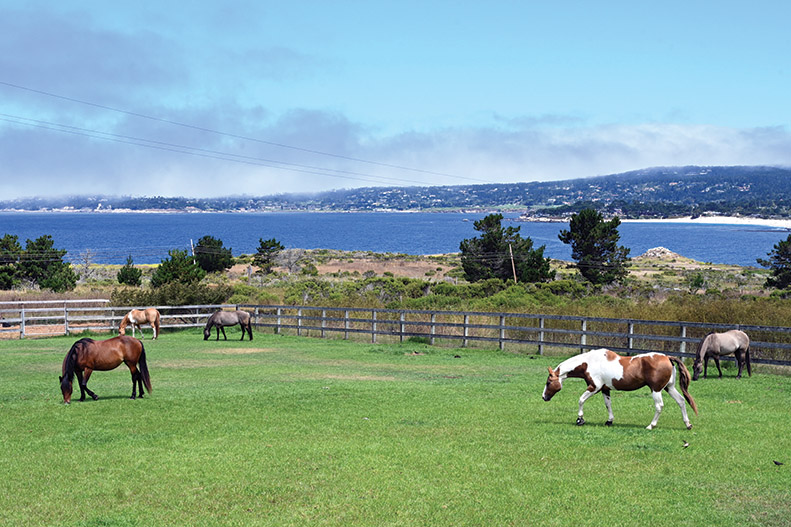
For many millennia, the fates and fortunes of humans and horses have been intimately intertwined. Exactly when Homo sapiens domesticated the first of these superb animals has been the subject of much debate and scientific study, but that occurrence dates to at least 2,000 B.C. Humans harnessed horses for use in agriculture and ranching, transportation, sport, warfare, pleasure and many other pursuits. It’s safe to say they were essential to the rise of mankind’s domination of the earth.
Machines have long taken over most of the tasks assigned to Equus (though the yardstick we still use to measure their strength is “horsepower”). In the main, they’re kept for pleasure riding, but there remain many working animals, such as those used for herding cattle and for spectacular performances, such as the Lipizzaner of Vienna’s Spanish Riding School. Most are treated very well, with respect and loving care, but occasionally, some are not so lucky. That’s where Sea Star Horse Sanctuary comes into the picture.
According to its mission statement, Sea Star “rescues, rehabilitates and provides lifetime sanctuary to ponies and horses at risk of needless slaughter, who are old and/or injured, or who have been abandoned with nowhere to go…Sea Star Horse Sanctuary seeks to improve the quality of life of the horses at its sanctuary by providing specialized nutrition, proper exercise and the highest standard of veterinary and holistic care.” In addition, Sea Star gives community members—adults and children—the privilege of forming “transformative relationships between humans and horses.”
Years ago, hospitality industry executive Sharon Regan began caring for troubled horses as a labor of love. Following her retirement, she took the step of obtaining 501(c)(3) nonprofit status and now serves as president and CEO of the organization. “I have a true, deep love and devotion for these magnificent beings,” she says. “I know this is my life’s purpose.” Caring for distressed animals has always been a part of her life. “Growing up, my mother would always take in and care for strays or injured animals and most of them became part of our family. She learned this from my grandfather who was head game warden for the state of Wyoming. He brought home injured or orphaned animals for her to nurse back to health or until they were old enough to be re-released.”
The sanctuary occupies more than eight bucolic and serene acres overlooking Point Lobos and Carmel Bay. Neat-as-a-pin stables sit above fenced and lush grassy areas where the resident horses (limited to 10 at any time) are free to graze together to their hearts’ content. “Horses are herd animals,” says Carmel Valley Master Horseman Ray Berta. “At Sea Star, Sharon is giving these horses a better life in every way possible. The way that they’re stabled and the environment she’s created is wonderful, as is the way she and her staff and volunteers handle and manage them. They have room to move around and grass to graze on. They’re taken care of in a way that’s more natural to the horse.”
Berta has known Regan for years and has been involved in Sea Star since its beginnings. “I got my first horse in 1990 and met Ray at a horse clinic shortly after,” she says. “We forged a strong connection and have worked together since. He taught me how to foster a relationship with horses that allows us to move together.”
Jacki Pelosi-Harris is one of more than 20 highly-dedicated, motivated volunteers who generously lends time and talent to the Sea Star cause. “The day I met Sharon, I went to the sanctuary and was profoundly moved,” she recalls. “Soon, I was there weekly, learning the nuances of horsemanship with Sharon and Ray.” Currently, she serves on the Sea Star board and predominantly cares for the horses through her work as an equine massage and medical Qi Gong practitioner. “Being with a horse without a saddle, bridle, halter or rope, on the ground, face to face, in nature imparts a sense of vulnerability and of presence. It’s similar to what one might try to achieve in a mindfulness practice or on a yoga mat but with a distinct and powerful sense of heart opening. The willingness of these majestic beings to trust and accept our humanness is overwhelmingly beautiful.”
“We could not be successful without our volunteers,” Regan says. They groom, walk/exercise the horses, maintain the pastures, clean up manure and perform a myriad of essential services to the facility.
“A typical sanctuary day starts with a 5am feeding, and the rest of the day is dynamic and dependent upon the daily schedule and how many volunteers are on hand,” Regan says. Throughout the week, activities can include exercising the horses, holistic care sessions, veterinarian and hoof care, scheduled community visits, equine-guided learning for youth programs or hosting workshops.
“We want visitors and children to experience the real essence of horses by being up close, feeling their warmth by touching and hugging them,” Regan explains. “These animals are profound teachers and have served and taught us without expectation for anything in return for many years. By being so connected to the earth and its rhythms they can show us how to be present and calm within ourselves. They deserve our love, respect and honor.”
Pelosi-Harris adds, “Through our mission we promote the horse as innately valuable and worthy of lifetime care and love.”
For more information, call 831/595-2185 or visit www.seastarhorsesanctuary.org.